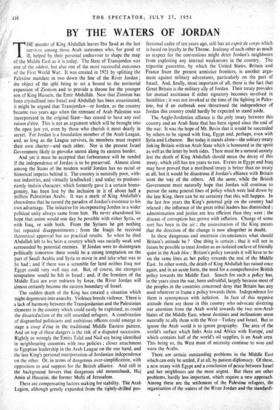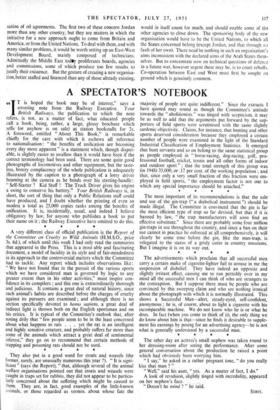BY THE WATERS OF JORDAN
THE murder of King Abdullah leaves Ibn Saud as the last survivor among those Arab statesmen who, for good or ill, helped by their personal endeavour to shape the map of the Middle East as it is today. The State of Transjordan was one of the oddest, but also one of the most successful outcomes of the First World War. It was created in 1921 by splitting the Palestine mandate in two down the line of the River Jordan ; the object of the split being to set a bound to the territorial expansion of Zionism and to provide a throne for the younger son of King Hussein, the Emir Abdullah. Now that Zionism has been crystallised into Israel and Abdullah has been assassinated, it might be argued that Transjordan—or Jordan, as the country became two years ago when the remnant of Arab Palestine was incorporated in the original State—has ceased to have any real raison d'être. This is not an argument which will be brought into the open just yet, even by those who cherish it most dearly in secret. For Jordan is a foundation member of the Arab League, and, as long as the League survives, its members must respect their own charter—and each other. Nor is the present Israel Government likely to provoke unrest along its eastern border.
And yet it must be accepted that forbearance will be needed if the independence of Jordan is to be preserved. Almost alone among the States of the modern world -Jordan has no racial or historical impetus behind it. The country is naturally poor, with- out industries, and virtually landlocked ; and today its. predomi- nantly beduin character, which formerly gave it a certain homo- geneity, has been lost by the inclusion in it of about half a million Palestinian Arabs. It was a mark of King Abdullah's shrewdness that he turned the paradox of Jordan's existence to his own advantage. The initiative for incorporating Jordan in a wider political unity always came from him. He never abandoned his hope that union would one day be possible with either Syria, or with Iraq, or with both. From the Syrians he got nothing but repeated disappointments ; from the Iraqis he received theoretical approval but no practical results. So when he died Abdullah left to his heirs a country which was socially weak and surrounded by potential enemies. If Jordan were to disintegrate. politically tomorrow there would be a strong temptation on the part of Saudi Arabia and Syria to move in and take what was to be had ; and if there was a scramble for land neither Iraq nor Egypt could very well stay out. But, of course, the strongest temptation would be felt in Israel ; and, if the frontiers of the Middle East are ever redrawn by force, the River Jordan will almost certainly become the eastern boundary of Israel.
The sudden death of the King has created a situation which might degenerate into anarchy. Violence breeds violence. There is a lack of harmony between the Transjordanian and the Palestinian elements in the country which could easily be exploited, as could the dissatisfaction of the still unsettled refugees. A combination of disgruntled politicians and ambitious officers could emerge to stage a coup d'etat in the traditional Middle Eastern pattern. And on top Of these dangers is the risk of a disputed succession. Rightly or wrongly the Emirs Talal and Naif are being identified in neighbouring countries with two policies ; closer attachment to Egyptian leadership in the Arab League on the one hand, and the late Kines personal interpretation of Jordanian independence on the other. Or, in terms of dangerous over-simplification, with opposition to and support for the British alliance. And still in the background hovers that dangerous old mountebank, Haj Amin al Husseini, the former Mufti of Jerusalem.
There are compensating factors making for stability. The Arab Legion, although greatly expanded from the tightly-drilled pro- fessional cadre of ten years ago, still has an esprit de corps which is based on loyalty to the Throne. Jealousy of each other as much as respect for the conventions might deter Jordan's neighbours_ from exploiting any internal weaknesses in the country. The tripartite guarantee, by which the United States, Britain and France froze the present armistice frontiers, is another argu- ment against military adventures, particularly on the part of Israel. And, finally, most important of all, there is the fact that Great Britain is the military ally of Jordan. Their treaty provides for mutual assistaike if either signatory becomes involved in hostilities ; it was not invoked at the time of the fighting in Pales- tine, but if an outbreak now-threatened the independence of Jordan this country could hardly be expected to stand aside.
The Anglo-Jordanian alliance is the pnly treaty between this country and an Arab State that has been signed since the end of the war. It was the hope of Mr. Bevin that it would be succeeded by others to be signed with Iraq, Egypt and, perhaps, even with Syria and Lebanon. But today it stands alone—the solitary treaty linking Britain withian Arab State which is honoured in the spirit as well as the letter by both sides. There must be a natural anxiety lest the death of King Abdullah should mean the decay of this treaty, which still has ten years to run. Events in Egypt and Iraq may have proved that a moribund treaty is better than no treaty at all, but it would be disastrous if Jordan's alliance with Britain went the way of the others. All the same, while the British Government must naturally hope that Jordan will continue to pursue the same general lines of policy which were laid down by the late King, there can be no certainty that this will happen. In the last few years the King's paternal grip on the country had relaxed ; the influence of the great tribal leaders has diminished ; administration and justice are less efficient than they were ; the disease of corruption has grown with inflation. Change of some sort has been in the air ; the assassination of the King means that the direction of the change is now altogether in doubt.
In these dangerous and uncertain circumstances what should Britain's attitude be ? One thing is certain ; that it will not in future be possible to treat Jordan as an isolated enclave of friendly quiet in the Arab bloc ; Britain's policy towards it will have to be on the same lines as her policy towards the. rest of the Middle East. In other words, the death of King Abdullah has raised once again, and in an acute form, the need for a comprehensive British policy towards the Middle East. Search for such a policy has, in the years since the war, been unfruitful, largely because most of the peoples in the countries concerned deny that Britain has any need whatever to framie a policy towards them. Independence for them is synonymous with 'isolation. In face of this negative attitude there are those in this country who advocate diverting our attention from the Arab world towards the two non-Arab States of the Middle East, whose destinies and inclinations seem naturally to ally them with the West—Turkey and Israel. But to ignore the Arab world is to ignore geography. The area of the world's surface which links Asia and Africa with Europe, and which contains half of the world's oil supplies, is an Arab area. This being so, the West must of necessity continue to woo and warn the Arabs.
There are certain outstanding problems in the Middle East which can only be settled, if at all, by patient diplomacy. Of these, a new treaty. with Egypt and a conclusion of peace between Israel and her neighbours are the most urgent. But there are other problems, hardly less important, which require a new approach. Among these are the settlement of the Palestine refugees, the organisation of the waters of the River Jordan and the standardi- sation of oil agreements. The first two of these concern Jordan more than any other country, but they are matters in which the initiative for a new approach ought to come from Britain and America, or from the United Nations. To deal with them, and with many similar problems, it would be worth setting up an East-West Development Board, mainly composed of technicians. Admittedly the Middle East todity proliferates boards, agencies and commissions, some of which produce too few results to justify their existence. But the gesture of creating a new organisa- tion,better staffed and financed than any of those already existing, would in itselicount for much, and should enable some of the other agencies to close down. The sponsoring body of the new organisation would have to be the United Nations, to which all the States concerned belong (except Jordan, and that through no fault of her own). There need be nothing in such an organisation's aims inconsistent with the declared aims of the Arab States them- selves. But to concentrate now on technical questions of defence in a future war, however urgent these may be, is to court rebuffs. Co-operation between East and West must first be sought on ground which is genuinely common.



































 Previous page
Previous page